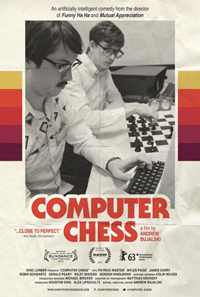Check Mix: Bujalski’s Latest an Odd, Enigmatically Dry Experiment
 For his fourth feature film, indie film director Andrew Bujalski tackles the period peace, revisiting an early 80’s computer chess competition and filmed with obsolete 60’s era video cameras, supremely fitting for a film about swiftly changing technological advances and communication skills. Strangely reminiscent of Pablo Larrain’s No, also shot with archaic video for a more realistically 1980s feel, Bujalski at last evades all semblance of mumblecore comparisons that have accompanied his three previous titles, this time concocting a droll black and white universe that begins like some painfully dense IT manual before it slowly morphs into a subtly bizarre enigma where thing (i.e., narrative coherence) fall apart.
For his fourth feature film, indie film director Andrew Bujalski tackles the period peace, revisiting an early 80’s computer chess competition and filmed with obsolete 60’s era video cameras, supremely fitting for a film about swiftly changing technological advances and communication skills. Strangely reminiscent of Pablo Larrain’s No, also shot with archaic video for a more realistically 1980s feel, Bujalski at last evades all semblance of mumblecore comparisons that have accompanied his three previous titles, this time concocting a droll black and white universe that begins like some painfully dense IT manual before it slowly morphs into a subtly bizarre enigma where thing (i.e., narrative coherence) fall apart.
Personal computers are an exciting new novelty and we’re placed somewhere in the early 80’s at an ultra geeky computer chess tournament frequented by various teams of socially awkward IT people (of which there seems to be one lone female member). One brazen game whiz has defied technology, claiming that no computer will beat him at chess before the year 1984. A critic advises him towards the beginning of the narrative not to extend that proclamation past that year as computer technology is advancing at a rapid pace (a fact that seems to have many predicting the end of days).
We follow several members of these teams, including a wandering freelance programmer, Michael Papageorge (Myles Page) whose reservation has been lost, forced to depend on the awkward kindness of others. Then there’s Peter from the Accounting team, who builds a shy romance with Shelly (Robin Schwartz) by including her in testing out his hypothesis that the computer programs are changing their game strategies on their own. The tournament is sharing the hotel space with a couple’s therapy convention, the members of each group intermingling in oddly surprising fashion. A bouffant prostitute silently stands post outside the front entrance of the hotel, and slowly but surely, hairy felines begins appearing in abundance and unexplainably in the hotel hallways. Artificial Intelligence has seemed to derail the natural order of things, developing a mind of its own, while the chess players seem wrapped up in their own personal conundrums of how to view the world. In one philosophical discussion, a player comments that “Chess is not war. War is death, hell is pain, chess is victory.”
Unfolding in a seemingly random fashion, the sublime riches of Bujalski’s latest are in the little details. Laborious conversations abound, fooling us into a sort of banal complacency while slowly unspooling an unmistakable oddness that’s as fascinating as it is off-putting. It’s final few frames completely seem to jump the track, as the competition comes to a close, stranger things start to happen, including Peter from Accounting leading the mute, lion-haired hooker into his hotel room for what could easily be a scene from some Lynchian nightmare.
Bujalski’s experiment in reimagining the onslaught of the computer age seems to be a joke, an exercise in artificial entertainment, if you will. Winner of the Alfred P. Sloan Prize at Sundance 2013, Computer Chess is surprisingly provocative and delightfully maddening.


